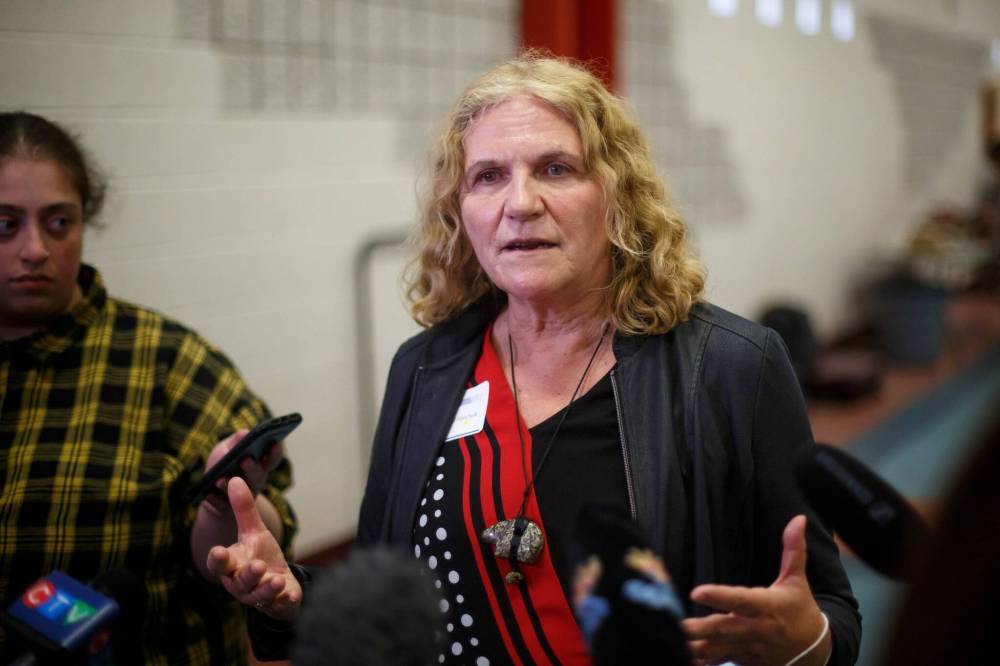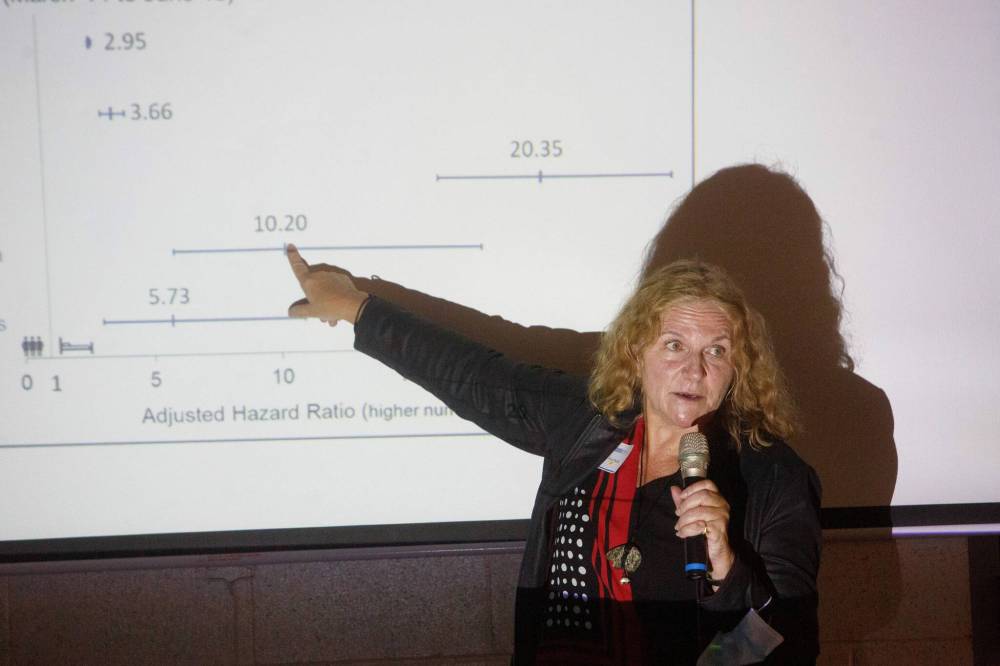Project aims to keep better track of Canada’s homeless
Advertisement
Read this article for free:
or
Already have an account? Log in here »
To continue reading, please subscribe:
Monthly Digital Subscription
$0 for the first 4 weeks*
- Enjoy unlimited reading on winnipegfreepress.com
- Read the E-Edition, our digital replica newspaper
- Access News Break, our award-winning app
- Play interactive puzzles
*No charge for 4 weeks then price increases to the regular rate of $19.00 plus GST every four weeks. Offer available to new and qualified returning subscribers only. Cancel any time.
Monthly Digital Subscription
$4.75/week*
- Enjoy unlimited reading on winnipegfreepress.com
- Read the E-Edition, our digital replica newspaper
- Access News Break, our award-winning app
- Play interactive puzzles
*Billed as $19 plus GST every four weeks. Cancel any time.
To continue reading, please subscribe:
Add Free Press access to your Brandon Sun subscription for only an additional
$1 for the first 4 weeks*
*Your next subscription payment will increase by $1.00 and you will be charged $16.99 plus GST for four weeks. After four weeks, your payment will increase to $23.99 plus GST every four weeks.
Read unlimited articles for free today:
or
Already have an account? Log in here »
Hey there, time traveller!
This article was published 18/04/2023 (965 days ago), so information in it may no longer be current.
Researchers are creating a national database that would better track Canada’s homeless population — including age, gender and identifiable groups — and make it easier to develop supports for them.
“We know that the current method of figuring out how many people in all of Canada are homeless seriously underestimates the problem,” said Cheryl Forchuk, principal investigator of the “Homelessness Counts” project by Ontario-based Lawson Health Research Institute, who spoke at a Winnipeg forum Tuesday.
“I don’t think there’s anyone who believes across the entire country, in the course of an entire year, we only have 235,000 (homeless) people, but that’s what the federal numbers suggest… The problem is the funding follows the bad math.”

Mike Deal / Winnipeg Free Press
Scientist Dr. Cheryl Forchuk, who has been working closely with the several federal agencies to work on generating more accurate national numbers on homelessness, said current efforts don’t properly calculate the magnitude of the problem.
The federal government tracks numbers through its Homeless Individuals and Families Information System, and cities typically conduct their own data collection, but Forchuk said current efforts don’t properly calculate the magnitude of the problem.
Researchers at the institute are studying how provincial databases track homeless Canadians, with the hope of integrating the data into a streamlined formula that would paint a clearer picture of the scope of the problem.
Using Ontario health data, the institute developed an algorithm to follow how the homeless population accessed supports compared with the general population. Items they looked at included medical care, hospital visits, prescription medication, and ambulance use. The data was compared with the provincially collected numbers on homelessness and studies on people who are vulnerable to becoming homeless.
The results show the province greatly underrepresents the number of homeless people, said Forchuk.
“When we applied it to the whole province, we found that it looked like the current method with the housing sector could be three times off,” she said Tuesday.
“Part of our methodology is to understand the local context to see can we bring this across the country, and can we bring in other data sets in here as well?”
She said the methodology could be used to better understand the homeless crisis in Manitoba.
The project has received funding from the Public Health Agency of Canada.
In 2021, researchers began travelling across the country to speak with homeless Canadians and groups that provide supports to them. Unhoused people were asked what support services and health care options they were most likely to use, and support workers were questioned about how they keep track of homeless people.
“When we were looking at homeless veterans, we found the first service they will access is the Canadian Legion and the poppy funds,” she said. “So if you know where people go for help, you have an idea of where they can show up in data.”
That data, Forchuk said, is being used to fine-tune the algorithm so it more accurately represents homeless people across the country.
“For example, we used our algorithm to show people experiencing homelessness were 20 times more likely to be hospitalized with COVID than the general population. That’s pretty significant,” she said.
“It means that they need to be prioritized. And they were prioritized for vaccines. It also means we need to be thinking about infection control, even when we’re not in a pandemic.”

Mike Deal / Winnipeg Free Press
“Part of our methodology is to understand the local context to see can we bring this across the country, and can we bring in other data sets in here as well?” said scientist Dr. Cheryl Forchuk.
In Manitoba, the researchers went to 28 communities, including Winnipeg and Thompson, and spoke to 400 unhoused people and 190 service providers.
In Winnipeg, non-profit End Homelessness Winnipeg holds a point-in-time count annually, meaning they hold a street census over a one-day period wherein hundreds of volunteers count how many people in the city are unhoused. They conduct surveys on demographic information and ask where people had slept the night prior. This data is analyzed by researchers, support workers and people with lived experience.
End Homelessness Winnipeg collaborated on the “Homelessness Counts” research, which CEO Jason Whitford said made clear that more federal attention is needed to address homelessness in Winnipeg and across the country.
“Tracking homelessness is a moving target. It changes. There’s weather patterns, there’s hidden homelessness,” he said.
“What our data revealed through the streets census was that for every one person that we’re able to connect with, whether it’s on the streets, or an encampment, or an emergency type of resource, there’s another three or four that are hidden homelessness, so the numbers are actually quite higher.”
Researchers are working with the federal agency that collects national data on homelessness to improve the algorithm.
“We can take that data and interpret it in order to present a convincing argument to decision makers, whether they’re the city, the province, the federal government. The data tells the story, the data provides evidence,” Whitford said.
“We can also take the data and apply it to innovative approaches that have positive impact. I think it’s the way forward, I think utilizing the data, it presents the financial case, the argument, for impactful investments.”
malak.abas@freepress.mb.ca

Malak Abas is a city reporter at the Free Press. Born and raised in Winnipeg’s North End, she led the campus paper at the University of Manitoba before joining the Free Press in 2020. Read more about Malak.
Every piece of reporting Malak produces is reviewed by an editing team before it is posted online or published in print — part of the Free Press‘s tradition, since 1872, of producing reliable independent journalism. Read more about Free Press’s history and mandate, and learn how our newsroom operates.
Our newsroom depends on a growing audience of readers to power our journalism. If you are not a paid reader, please consider becoming a subscriber.
Our newsroom depends on its audience of readers to power our journalism. Thank you for your support.



